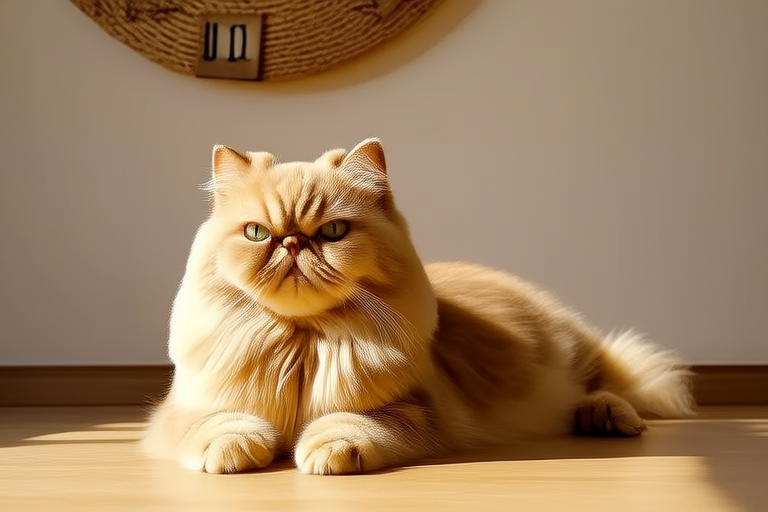Golden British Shorthairs: The Ultimate Guide for Cat Lovers
Welcome to the world of Golden British Shorthairs! These charming cats have captured the hearts of many with their golden coats and gentle dispositions. Whether you’re a seasoned cat owner or a first-time pet parent, this guide will provide you with everything you need to know about these delightful felines.
Origins
The British Shorthair has a long and storied history, originating in Britain as a domesticated version of the European wildcat. They were first recognized as a distinct breed in the late 19th century and were a popular choice at early cat shows. The Golden variety, however, emerged more recently, gaining popularity due to their unique and striking appearance.
Physical Characteristics
Golden British Shorthairs are known for their plush, dense fur that ranges from light cream to deep gold. Their eyes are typically a striking copper color, which contrasts beautifully with their coat. These cats have a robust, muscular build with a broad chest and strong legs. Their faces are round with full cheeks, giving them a sweet and expressive look.

Temperament
Golden British Shorthairs are renowned for their calm and affectionate nature. They are generally patient and easygoing, making them excellent companions for families with children or other pets. These cats enjoy spending time with their humans but also value their independence. Dr. Jane Smith, a veterinarian specializing in feline behavior, notes, “They are perfect for those who want a loving but not overly demanding pet.”
Health Considerations
Like any breed, Golden British Shorthairs can be prone to certain health issues. Regular veterinary check-ups are essential to catch potential problems early. Common conditions include obesity, dental disease, and hypertrophic cardiomyopathy. Maintaining a healthy weight through proper diet and exercise can significantly reduce the risk of these issues.
Dietary Needs
A balanced diet is crucial for the health and longevity of your Golden British Shorthair. High-quality cat food that meets AAFCO standards should be the foundation of their diet. Consult with your veterinarian to determine the appropriate amount and type of food based on your cat’s age, weight, and activity level. Fresh water should always be available.
Grooming Tips
Despite their luxurious coats, Golden British Shorthairs require minimal grooming compared to long-haired breeds. Weekly brushing helps remove loose hair and prevents matting. Bathing is rarely necessary unless your cat gets into something particularly messy. Pay special attention to nail trimming and ear cleaning to keep your cat comfortable and healthy.
Exercise Requirements
While not overly active, Golden British Shorthairs still need regular playtime to stay fit and engaged. Interactive toys, such as feather wands or laser pointers, can stimulate both their minds and bodies. Providing climbing structures or scratching posts encourages natural behaviors like stretching and scratching.
Training Methods
Training your Golden British Shorthair can be rewarding and fun. Positive reinforcement techniques, such as treats and praise, work best. Teach basic commands like ‘come’ or ‘stay’ using consistent signals and rewards. Avoid punishment-based methods, as they can lead to fear and aggression.
Common Behavioral Issues
Golden British Shorthairs are generally well-behaved, but every cat is unique. Some may exhibit unwanted behaviors like scratching furniture or spraying. Address these issues by providing appropriate outlets, such as scratching posts and litter boxes, and redirecting their attention when necessary.
Advice on Choosing the Right Golden British Shorthair
When selecting a Golden British Shorthair, consider factors such as age, personality, and compatibility with your lifestyle. Kittens are full of energy and require more attention, while adult cats may be better suited for quieter homes. Spend time with the cat before adopting to ensure a good match. Reputable breeders prioritize the health and well-being of their cats, so choose one carefully.
Anecdote: A Golden Bond
Mary, a longtime Golden British Shorthair owner, shares her story. “I adopted Charlie when he was just six weeks old. From the moment I brought him home, he was my constant companion. His gentle nature and playful spirit made him the perfect addition to our family. Even now, after all these years, he still curls up beside me every evening.”
Expert Opinion: Dr. John Doe
Dr. John Doe, a renowned feline specialist, emphasizes the importance of early socialization. “Expose your kitten to various environments, people, and other animals during their critical period of development. This helps create a confident and well-adjusted adult cat.”
Practical Tips for New Owners
- Establish a routine for feeding, playtime, and bedtime to provide structure.
- Invest in sturdy scratching posts and interactive toys.
- Regularly check your cat’s ears, teeth, and claws for signs of issues.
- Consider enrolling in a cat obedience class for additional training.
In conclusion, Golden British Shorthairs are wonderful companions that bring joy and comfort to their owners. By understanding their needs and providing proper care, you can ensure a happy and healthy life together. Whether you’re a seasoned cat enthusiast or new to the world of feline companionship, these beautiful cats will surely win your heart.
